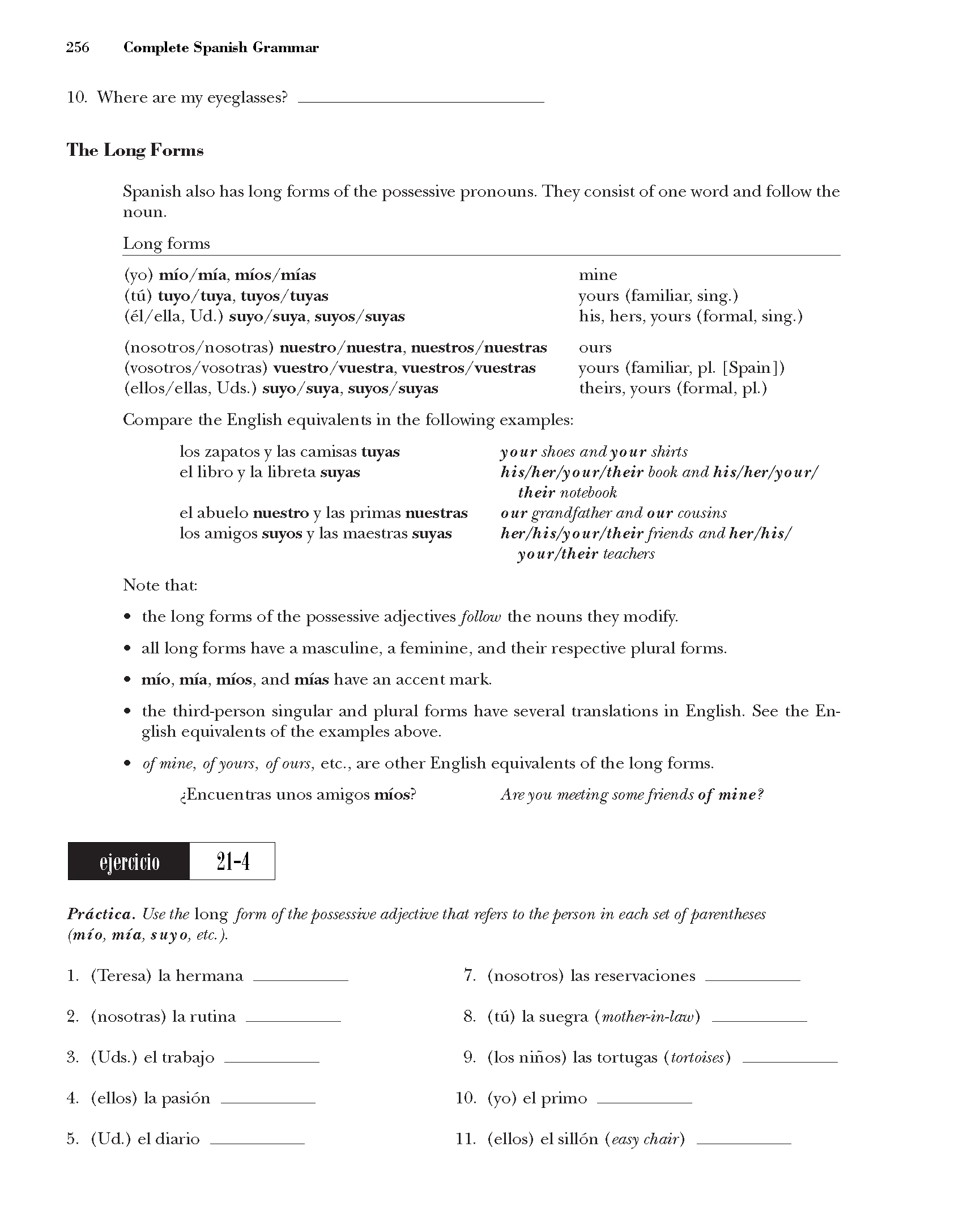CSG267

256 Complete Spanish Grammar 10. Where are my eyeglasses?
The Long Forms
Spanish also has long forms of the possessive pronouns. They consist of one word and follow the noun.
Long forms
minę
yours (familiar, sing.)
his, hers, yours (formal, sing.)
ours
yours (familiar, pl. [Spain]) theirs, yours (formal, pl.)
(yo) mio/nńa, mios/mi as
(tu) tuyo/tuya, tuyos/tuyas
(el/ella, Ud.) suyo/suya, suyos/suyas
(nosotros/nosotras) nuestro/nuestra, nuestros/nuestras (vosotros/vosotras) vuestro/vuestra, vuestros/vuestras (ellos/ellas, Uds.) suyo/suya, suyos/suyas
Compare the English equivalents in the followmg examples:
los zapatos y las camisas tuyas el libro y la librę ta suyas
el abuelo nuestro y las primas nuestras los amigos suyos y las maestras suyas
your shoes andyour shirts his/her/your/their book and his/her/your/ their notebook
our grandfather and our cousins her/his/y our/theirfńends and her/his/ your/itheir teachers
Notę that:
• the long forms of the possessive adjectives follow the nouns they modify.
• all long forms have a masculine, a feminine, and their respective plural forms.
• mio, ima, nhos, and nhas have an accent mark.
• the third-person singular and plural forms have several translations in English. See the English equivalents of the examples above.
• of minę, of yours, of ours, etc., are other English equivalents of the long forms.
-Tncuentras unos amigos nhos? Are you meeting some fńends of minę?
21-4
ejercicio
Practica. Use the long form of the possesswe adjectwe that refers to the person in each set of parentheses (mio, mi a, suyo, etc.).
1. (Teresa) la hermana
2. (nosotras) la rutina .
3. (Uds.) el trabajo _
4. (ellos) la pasión _
5. (Ud.) el diario _
7. (nosotros) las reservaciones _
8. (tu) la suegra (mother-in-law) _
9. (los nińos) las tortugas (tońoises)
10. (yo) el primo _
11. (ellos) el sillón (easy chair) _
Wyszukiwarka
Podobne podstrony:
6 Where are my CDs? I can’t find they / them / theirs! 3 Napisz zainki osobowe. 1J
CSG143 Complete Spanish Grammar Notę that there are two parts or clauses (clausulas) in the precedin
CSG021 10 Complete Spanish Grammar 1-13ejercicio Practica. Escribe la forma correspondiente del verb
CSG057 46 Complete Spanish Grammar Morę Irregular Yerbs in the Preterit • Dar, ser, and ir are irreg
CSG121 110 Complete Spanish Grammar 10-10ejercicio La mudada. Traduce. Usa elvocabulario util. I hav
CSG141 130 Complete Spanish GrammarImpersonal Constructions Used to Suhstitute for Passive Construct
CSG275 264 Complete Spanish Grammar The accent marks are only required for clarification if the cont
więcej podobnych podstron